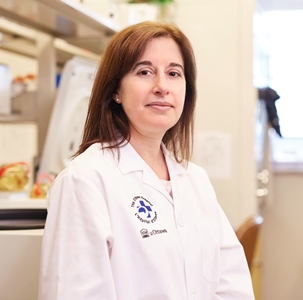 Cancer-killing (oncolytic) viruses have shown promise in the lab and the clinic, but they don’t always work. New research led by Dr. Carolina Ilkow could help change this.
Cancer-killing (oncolytic) viruses have shown promise in the lab and the clinic, but they don’t always work. New research led by Dr. Carolina Ilkow could help change this.
While normal cells often lose their first line of antiviral defenses when they become cancerous, Dr. Ilkow and her team discovered that many cancer cells maintain an ancient antiviral defense mechanism called RNA interference. In essence, they cut up viral genetic material, destroying the virus. This kind of antiviral defense is very important in plants, fungi and insects, but was thought to be less important in mammals.
Dr. Ilkow and her team created a virus that blocks RNA interference and found that it was much better at killing cancer cells, while still being harmless to normal cells. This research could lead to the development of better cancer-fighting viruses, as well as biomarkers to determine if an individual’s cancer will be susceptible.
“We’ve shown for the first time that many cancer cells use a very different approach than normal cells to defend against viruses,” said Dr. Ilkow, a scientist at The Ottawa Hospital and assistant professor at the University of Ottawa. “We hope to exploit this weakness to develop better cancer-fighting viruses.”
Reference: Journal for ImmunoTherapy of Cancer
Authors: Bastin D, Aitken AS, Pelin A, Pikor LA, Crupi MJF, Huh MS, Bourgeois-Daigneault MC, Bell JC, Ilkow CS.
Information for patients: Cancer-fighting viruses are still considered experimental and are only available in Canada as part of clinical trials. See these frequently asked questions about clinical trials with cancer-fighting viruses at The Ottawa Hospital.
Funding: This study was possible because of generous donations to The Ottawa Hospital for cancer research. This research was also supported by the Terry Fox Research Institute, the Canadian Institutes of Health Research, the Ontario Institute for Cancer Research, the Ottawa Regional Cancer Foundation, the Joseph and Wolf Lebovic Cancer Genomics and Immunity Fellowship and an Ontario Graduate Scholarship.
Core Facilities: StemCore
The Ottawa Hospital: Inspired by research. Driven by compassion
The Ottawa Hospital is one of Canada’s largest learning and research hospitals with over 1,100 beds, approximately 12,000 staff and an annual budget of over $1.2 billion. Our focus on research and learning helps us develop new and innovative ways to treat patients and improve care. As a multi-campus hospital, affiliated with the University of Ottawa, we deliver specialized care to the Eastern Ontario region, but our techniques and research discoveries are adopted around the world. We engage the community at all levels to support our vision for better patient care. See www.ohri.ca for more information about research at The Ottawa Hospital.
University of Ottawa: —A crossroads of cultures and ideas
The University of Ottawa is home to over 50,000 students, faculty and staff, who live, work and study in both French and English. Our campus is a crossroads of cultures and ideas, where bold minds come together to inspire game-changing ideas. We are one of Canada’s top 10 research universities—our professors and researchers explore new approaches to today’s challenges. One of a handful of Canadian universities ranked among the top 200 in the world, we attract exceptional thinkers and welcome diverse perspectives from across the globe. www.uottawa.ca
Media Contact
Jennifer Ganton
Director, Communications and Public Relations
Ottawa Hospital Research Institute
Office: 613-798-5555 x 73325
Cell: 613-614-5253
jganton@ohri.ca
